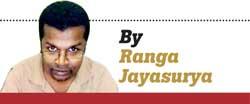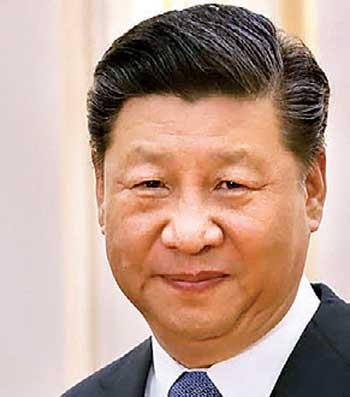25 Oct 2022 - {{hitsCtrl.values.hits}}
 Chinese President Xi Jinping secured a convention - shattering and unprecedented - though not unexpected- third term at the 20th National People’s Congress that ended on Sunday, elevating him to a status that would even make Mao Zedong envy – and Deng Xiaoping rolling in his grave.
Chinese President Xi Jinping secured a convention - shattering and unprecedented - though not unexpected- third term at the 20th National People’s Congress that ended on Sunday, elevating him to a status that would even make Mao Zedong envy – and Deng Xiaoping rolling in his grave.
Then Mr. Xi staked the Politburo standing committee, the innermost sanctum of the Communist Party with his loyalists. The Standing Committee, which now has seven members, is supposed to collectively govern China and the General Secretary, who ex-offico becomes the President and the Chairman of the Central Military Commission has been treated as one among equals since Deng Xiaoping, the reformist former paramount leader introduced changes in the early 1980s. Those included a mandatory two-term limit for China’s presidency, which also served as a cap on the term of the General Secretary. The objective was to avoid a repetition of yet another Maoist mayhem due to the concentration of power with a single leader.
 Deng’s reforms provided a form of quasi-constitutionalism to the otherwise politically monopolistic China’s Communist Party and moderated not only the conduct of the party hierarchy, who are otherwise law unto themselves, but also allowed the smooth transition of power through three generations of party leaders.
Deng’s reforms provided a form of quasi-constitutionalism to the otherwise politically monopolistic China’s Communist Party and moderated not only the conduct of the party hierarchy, who are otherwise law unto themselves, but also allowed the smooth transition of power through three generations of party leaders.
Mr. Xi has shattered that convention. Since the National People’s Congress, which this year had 2296 delegates is expected not more than to rubber-stamp the decisions made by the party hierarchy, gravity-defining changes that Mr. Xi effected – and NPC dutifully approved- during the previous congress and the just concluded 20th Congress betray his untrammelled control over the party.
The 19th Congress in 2017 removed the term limits of the presidency and the 20th Congress adopted four more amendments that ‘established’ Mr. Xi’s core status and two others that ‘safeguard’ his elevated status.
The only difference to Mao might be that, unlike Mao who resorted to the Cultural Revolution to cement his waning power after his disastrous experiment of famine-inflicted Great Leap Forward and hounded perceived competitors, at an expense of 1 million lives and a decade of chaos, Mr. Xi subdued the party with less collateral damage through an anti-corruption drive, which though meant to catch both tigers and flies, caught only the tigers of his opposing camp.
Mr. Xi is now in complete control of the Chinese Communist Party (CCP). He could well have elevated himself even above what Mao ever was. Mao ruled alongside the first generation of party members, most of whom were of the same age, and fought the same battles, though Mao’s charisma and certain behavioural dynamics of submission and subordination that every authoritarian system inflicted on its members allowed Mao to concentrate power in his hand.
Mr. Xi’s status is even more extravagant. He now reigns over a politburo standing committee comprising of his sidekicks, with the core status that elevates him above everything else in the Chinese state. There is no comparison to this since the end of the Qing Dynasty. He is an emperor all but by name. If any modern comparison, that would be someone akin to the Supreme Leader of Iran, whose power is absolute and unchecked. That is not a comparison the Chinese would like to have. Iran is a global pariah.
The new prime minister-designate is the current Shanghai Party chief, Li Qiang, who also happened to be Mr. Xi’s chief of staff when he was the party chief of Zhejiang province. He will succeed the incumbent Li Keqiang who will retire next March. Unlike his predecessors, Mr. Li does not have previous experience as a vice premier, instead, his ascendency is owed to his loyalty to Mr. Xi. As the Shanghai Party chief, Li is loathed for the prolonged covid lockdown, though such decisions are not the prerogative of provincial chiefs but are decided by the top. Li’s adherence to the zero covid policy to the letter may also signal the extent of his loyalty to Mr. Xi, who himself is the architect of the policy.
Only two members of the current Standing Committee - Wang Huning, 67, and Zhao Leji, 65, are re-elected to the Central Committee and the Standing Committee, both are loyalists of Xi.
Mr. Xi’s elevation of himself marked an end of an era of political reforms in the Chinese Communist Party. The TV footage of his predecessor, President Hu Jintao being escorted from the podium was an apt symbol of the end of the era, though Mr. Hu’s poor health was also suspected as grounds for impromptu departure.
The absence of Li Keqiang and any personality with a strong economic background have raised concerns over China’s economic policy trajectory.
However, for over 40 years of economic reforms and near double-digit growth China has harnessed resources and know-how that could not be squandered easily. As Adam Smith once said, there is a great deal in a ruin of a nation. The CCP, after all, has derived legitimacy to govern through the delivery of economic growth- and in Chinese nationalism.
Mr. Xi’s new China would be less democratic, however, democracy was never the strong point in China under the CCP. How much value the Chinese public places on free speech, free elections, and free assembly is a moot point, there are strong and long-conditioned social-cultural dynamics that decide the value of these freedoms. Instead under Mr. Xi, Chinese nationalism is likely to fill the vacuum of democratic deficit and slowing economic growth. IMF earlier cut China’s growth predictions for this year to 3.3 due to the impact of the Zero covid policy.
What matters most is how Mr. Xi’s China conducts its foreign policy. Though textbook realists would consider states as black boxes, the internal structures and domestic systems of governance have a strong bearing on the external conduct of a state. Development in the external neighbourhood of a state is interpreted by the leaders subjected to their ideological bias, prejudices and also personal calculations.
A supreme leader with unchecked power is prone to major miscalculations. Russia is a case in point, no democracy could have committed to a self-harming carnage for near nothing. Also, states preview others with inherent ideological bias; democracies favour peer democracies or those aspiring to be such. Mr. Xi’s absolute leadership is a cause for alarm for all its peer competitors and rivals.
Mr. Xi has already done so much for most Western democracies and even India to reconsider their complex interdependency with China, forcing most countries to force their global firms to restructure supply chains out of China. When security is at stake, the economy relegates to a second pillar. Mr Xi would accelerate the plight of foreign high-tech from China.
China’s overseas economic expansion would also come under further scrutiny which would have implications for BRI and countries like Sri Lanka which house a large bundle of Chinese overseas economic interests and are aspiring to attract more. Indian geopolitical concerns would also increase leading Sri Lanka to walk on a tightrope.
Mr. Xi may be power-hungry, but he cannot be stupid. Any military adventure over Taiwan, which he has wanted to reunify with China within his reign, would bring the entire façade crumbling down. Even without major escalation, China under its unchecked leadership would be perceived as more dangerous and capricious than it had been before by its peers and rivals.
Mr. Xi’s ostentatious foreign policy during the past decade was a shift from the low-key foreign policy of his predecessors. The changes he effected last week and his elevation as the absolute leader have effectively torn apart the humane face of the CCP. China’s rivals are justified to feel alarmed.
None of that though should stop President Ranil Wickremesinghe from sending a congratulatory message to Mr. Xi. Small countries do not have the luxury to pick and choose and have to go by the flow.
Follow @RangaJayasuriya
on Twitter
10 Jan 2025 56 minute ago
10 Jan 2025 2 hours ago
10 Jan 2025 2 hours ago
10 Jan 2025 3 hours ago
10 Jan 2025 3 hours ago